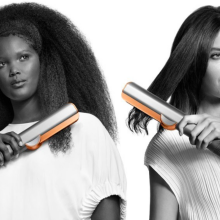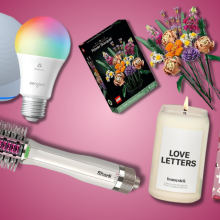It is a truth universally acknowledged that there is a face filter for everything, from putting puppy ears on your head to horrifically swapping your face with inanimate objects.
The latest filter trend on Snapchat is gender. Yep, just gender. This filter, in particular, captured people's attention in a way that others haven't, becoming so popular that people have re-downloaded Snapchat, an app seemingly being left in the social media dust, to use it.
The filter is fairly simple: It swaps your features for traditionally feminine or masculine ones. When it rolled out last week, the internet had a field day, with users fantasizing about what it would be like to swap genders. But it wasn't all fun and games for the trans community, who had to witness both their cis friends and strangers suddenly turning the act of "switching genders" into the latest viral joke.
What's worse is that this isn't one of the community-made filters available to download or ignore as you please. It's not just one amateur designer's attempt at humor. Coming from Snapchat itself, this means whatever impact the filter has is directly reflective of the company and its biases. This also allows more people to access the filter without having to actively seek it out, which increases its exposure.
While you're having fun posting about your imaginary chiseled jawline or flawless face of makeup, you might want to consider how this filter perpetuates some pretty whack stereotypes before you post your selfie. After all, casual transphobia looks good on no one.
Snapchat's filter problematically defines gender and presentation
The filter's "male" lens gives users a square jaw, scruff, and short hair. The female lens smooths out a user's skin, lengthens their hair, and adds makeup.
Through these changes, the "gender-swap" filter reveals what the company, and society in general, consider desirable presentations for men and women. That's because when conceiving of the idea of a filter that "swaps" your gender, there are assumptions the creative team must've made.
Tweet may have been deleted
a.t. Furuya, youth programs manager at GLSEN’s, told Mashable that, while intended as a "fun" joke, Snapchat is "assuming gender is a binary between men and women and more specifically, physical characteristics of how men and women should present themselves." GLSEN is an advocacy organization for LGBTQ youth.
Tweet may have been deleted
When Mashable reached out to Snapchat to learn about its thinking, the company said that new features go along with their core mission of empowering self-expression. Lenses can transform our appearance and the world around us, it wrote, adding that filters are a kind of "community storytelling."
Unfortunately, this "self-expression" forgets the wide spectrum of selves people can express. By creating a filter meant to represent an entire gender, you must choose to buy into certain narratives of what it means to look a certain gender. What features are the most beautiful? What are the "right" features? This assumes that everything else is deviant to the norm or unnatural.
Tweet may have been deleted
The filter also reinforces the heinous gender binary, implying that "man" and "woman" are opposite genders you can switch between. Furuya said this is limiting for everyone, and contributes to the narrative that there is only one right way to exist. "Nonbinary people have existed for centuries and in different cultures, [and] reinforcing an idea that people are either hyper masculine or hyper feminine creates very narrow boxes for how people can outwardly present themselves."
"Gotcha!" and digital drag deceit
On the whole, seeing cis people "swap" their gender for funsies gives off vibes of the old "man in a a dress" trope. Society says that it's not right for men to do things like wear makeup or have long hair. The sheer existence of trans women under the patriarchy is wrong. One may argue that the reverse trope — that of women donning shorter haircuts and "men's" clothing — is less negative for women, since it can be empowering for women to co-opt masculinity. That is, until it isn't.
Filters like these can be potentially detrimental to trans youth because they delegitimize trans identities, Furuya said. They can create more hurdles for trans people to live authentically without humiliation, violence, and erasure. "For trans students who already do not have laws or policies protecting their identities, this contributes to that discrediting sentiment that our identities are as fake as a Snapchat filter."
"This contributes to that discrediting sentiment that our identities are as fake as a Snapchat filter."
With the filter, if you turn your head too fast, wave your hand at the camera, or switch it off, the illusion disappears. Everyone laughs because at the end of the day, it was all just a trick of the eye. The joke here is that gender-bending is fun when everyone can return to "normal" with the flick of a head or the swipe of a finger.
It also doesn't help that men of Twitter and Instagram have been turning their experiences with facetuned femininity into experiments. Suddenly, men are creating fake Tinder profiles with their "female" selfies, catfishing unsuspecting horny Tinder bros, and screenshotting the responses in the name of ... something? Many claim that after receiving tons of unwanted harassment, they now understand how hard it is to be a woman online. The lesson some seem to have learned is an important one, but for others, the catfishing feels like a flippant joke.
Tweet may have been deleted
The joke, if there is one, relies on the underlying "gotcha!" that comes with convincing unsuspecting cis men of your gender, only to pull the wool from their eyes and laugh at the homosexual panic. Even if it's meant to be light-hearted, the group that's targeted by the normalization of this kind of humor is already vulnerable — trans people.
Tweet may have been deleted
Tweet may have been deleted
Your instant transition is another person's dysphoria
The virality of these "gender-swap" posts has meant that the internet has become even more of a casual transphobia landmine than usual. And the excuses fall flat: It's just harmless fun! Let people enjoy things! It might even be empowering! But it's hard to join in when the "fun" involves constantly reminding you of your dysphoria and the daily struggle of transitioning.
Viewing these posts from friends and family could contribute to dysphoria, because trans people are seeing those who are supposed to support and care for them participate in the humor of physical transition, Furuya said.
Tweet may have been deleted
On Twitter, many trans people are imploring cis people to think critically about the jokes' consequences. Some feel that the cis community doesn't understand the frustration of watching someone construct — in a single swipe — what transgender people may work at through years of pain and hardship.
Even just taking a moment to consider how mentally and physically exhausting it is to exist as a trans person can make all the difference in creating a more empathic and welcoming internet. Taking a step back can also help cis people consider the ways they interact with and support trans people offline.
Tweet may have been deleted
Tweet may have been deleted
Tweet may have been deleted
Tweet may have been deleted
It's almost never just a joke either. Furuya described casual transphobic humor, in online spaces or in everyday culture, as a "snow ball effect" that could lead to harm for the trans community. Letting these jokes slide allows cis people to become more comfortable with the dehumanization of trans identities.
"It is easier to not care about the safety of trans people if we are not a big deal to you," they explain. "When you keep picking away at our personhood, what is left to value? These are how transphobic laws and policies can get passed, this is how trans people get overlooked for jobs, this is the direct impact of trans youth being bullied and unable to finish school."
Tweet may have been deleted
Snapchat emphasized that it understands how deeply personal identities can be. But it's hard to swallow that when there's a community of people saying the filter makes a mockery of — and belittles — their identities. The way cis people have broadcasted their brief flirtations with bending gender demonstrates just how easy it is to misuse the filter.
Mistakes like this aren't new for the company. Snapchat has gotten into hot water in the past over previous filter missteps, turning what should've been basic marketing campaigns into oh my god this is so racist territory.
It would be easy for fans of the filter to chalk up these criticisms as a few oversensitive opinions to a feature that can be turned on and off in seconds. The novelty will probably wear off by next week. The latest filter is probably already in the works.
But as long as there are photo-sharing apps on the market, facetuning isn't going to go away. That doesn't mean we should blindly put up with the mistakes Snapchat or other designers make. Gender isn't as simple as a filter you can swipe away.
Topics Gender Snapchat Social Good

























